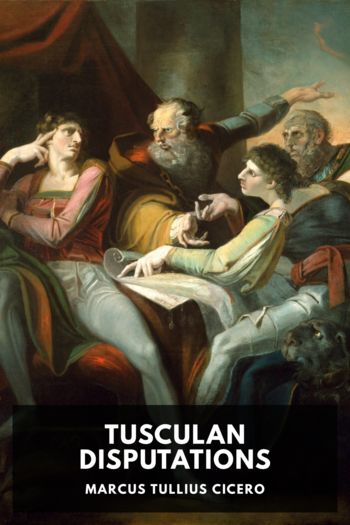Tusculan Disputations - Cicero (red novels TXT) 📗

- Author: Cicero
Book online «Tusculan Disputations - Cicero (red novels TXT) 📗». Author Cicero
Why, then, should Camillus be affected with the thoughts of these things happening three hundred and fifty years after his time? And why should I be uneasy if I were to expect that some nation might possess itself of this city ten thousand years hence? Because so great is our regard for our country, as not to be measured by our own feeling, but by its own actual safety.
Death, then, which threatens us daily from a thousand accidents, and which, by reason of the shortness of life, can never be far off, does not deter a wise man from making such provision for his country and his family as he hopes may last forever, and from regarding posterity, of which he can never have any real perception, as belonging to himself. Wherefore a man may act for eternity, even though he be persuaded that his soul is mortal—not, indeed, from a desire of glory, which he will be insensible of, but from a principle of virtue, which glory will inevitably attend, though that is not his object. The process, indeed, of nature is this: that just in the same manner as our birth was the beginning of things with us, so death will be the end; and as we were noways concerned with anything before we were born, so neither shall we be after we are dead. And in this state of things where can the evil be, since death has no connection with either the living or the dead? The one have no existence at all, the other are not yet affected by it. They who make the least of death consider it as having a great resemblance to sleep—as if anyone would choose to live ninety years on condition that, at the expiration of sixty, he should sleep out the remainder. The very swine would not accept of life on those terms, much less I. Endymion, indeed, if you listen to fables, slept once on a time on Latmus, a mountain of Caria, and for such a length of time that I imagine he is not as yet awake. Do you think that he is concerned at the Moon’s being in difficulties, though it was by her that he was thrown into that sleep, in order that she might kiss him while sleeping. For what should he be concerned for who has not even any sensation? You look on sleep as an image of death, and you take that on you daily; and have you, then, any doubt that there is no sensation in death, when you see there is none in sleep, which is its near resemblance?
Away, then, with those follies, which are little better than the old women’s dreams, such as that it is miserable to die before our time. What time do you mean? That of nature? But she has only lent you life, as she might lend you money, without fixing any certain time for its repayment. Have you any grounds of complaint, then, that she recalls it at her pleasure? for you received it on these terms. They that complain thus allow that if a young child dies, the survivors ought to bear his loss with equanimity; that if an infant in the cradle dies, they ought not even to utter a complaint; and yet nature has been more severe with them in demanding back what she gave. They answer by saying that such have not tasted the sweets of life, while the other had begun to conceive hopes of great happiness, and, indeed, had begun to realize them. Men judge better in other things, and allow a part to be preferable to none. Why do they not admit the same estimate in life? Though Callimachus does not speak amiss in saying that more tears had flowed from Priam than his son, yet they are thought happier who die after they have reached old age. It would be hard to say why, for I do not apprehend that anyone, if a longer life were granted to him, would find it happier. There is nothing more agreeable to a man than prudence, which old age most certainly bestows on a man, though it may strip him of everything else. But what age is long, or what is there at all long to a man? Does not
Old age, though unregarded, still attend
On childhood’s pastimes, as the cares of men?
But because there is nothing beyond old age, we call that long. All these things are said to be long or short, according to the proportion of time they were given us for. Artistotle says there is a kind of insect near the river Hypanis, which runs from a certain part of Europe into the Pontus, whose life consists but of one day. Those that die at the eighth hour die in full age; those who die when the sun sets are very old, especially when the days are at the longest. Compare our longest life with eternity, and we shall be found almost as short-lived as those little animals.
Let us, then, despise all these follies—for what softer name can I give to such levities?—and let us lay the foundation of our happiness in the strength and greatness of our





Comments (0)